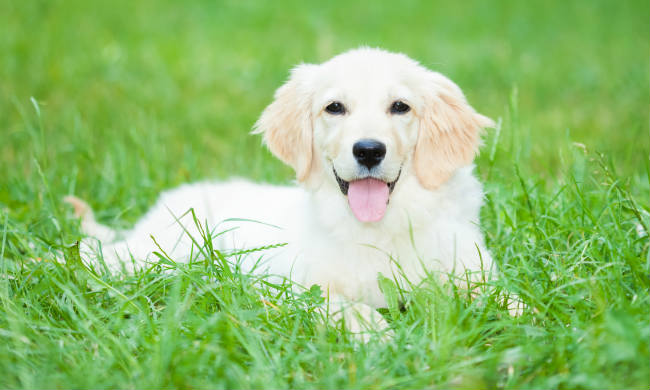
This post may contain affiliate links. We are compensated for referring customers to our affiliate partners.
Dog owners usually love having big yards where their pups can enjoy romping through the grass. Unfortunately, you may have noticed that it’s not always easy to keep your lawn green after Lassie does her business. Getting doused in dog urine can be a death sentence for your lawn, but there are actually several ways to prevent your pup from killing the grass. Here is a look at why your dog’s pee is making the grass brown and a few ways you can stop the problem.
Why Does Dog Urine Kill Grass?
Before you can start trying to prevent urine damage to your lawn, it’s important to understand why dog pee burns the grass in the first place. One reason why dog urine tends to turn your lawn brown is that it is too alkaline. Since dogs are carnivores, their urine should be slightly acidic, with a pH between 6 and 6.5. Often, however, your pup’s diet can raise the pH of urine above 7, which makes it much more likely to damage grass. Another major factor is the amount of nitrogen found in Lassie’s urine. Though nitrogen is an essential element of soil, too much of it is bad for your grass. When your dog pees, the concentrated nitrogen is all deposited in one spot, and the lawn suffers as a result.
Factors That Can Make A Lawn Burn Worse
Not all dog owners have a problem with their pup’s urine ruining their lawn. In fact, there are several other factors beyond simply owning a dog that can make your grass more likely to be susceptible. You will usually find that larger dogs tend to have more of an impact on your grass than small breeds–after all, they produce more urine. Female dogs are often the worst offenders because they squat in one place to release all of their urine while males often mark everything they pass and rarely empty their whole bladder in one place. Your lawn itself might also be as much of a problem as your dog’s urine. If you use too much fertilizer, for instance, it can make your grass more prone to nitrogen overload, and a little dog pee could push it over the edge. Lawns that are already stressed from a drought are also much more likely to die when exposed to urine.
Solutions for a Pesky Problem
Luckily, you don’t just have to accept defeat if your dog is ruining your lawn. There are several steps you can take to address the problem and keep your grass green and healthy. The easiest fix is often to wash away urine as quickly as possible and dilute it with water from a bucket or a hose. Keep an eye on your dog whenever you let her out, and then go outside after she pees and douse the affected area with water. By preventing the harmful components of urine from seeping into your grass, you can often ward off damage.
As a more long-term solution, try changing some of your pup’s habits. Take a look at the ingredients in the food Lassie is eating and avoid a cereal-based diet. Opt instead for foods that have a high meat content to help lower the pH of your pup’s urine to a more acidic level. You should also try to dilute the urine that is produced by encouraging your dog to consume plenty of extra water. Always keep the water bowl full and consider adding water to dry food. By increasing urine output with more water, you will naturally decrease the concentration of nitrogen, making the pee less likely to kill your grass.
If you find that your dog’s diet doesn’t have any impact on her urine, try replacing your grass with a heartier variety. Options like rye or fescue grass are much less likely to burn than Kentucky bluegrass or Bermuda grass. You can also opt for a patch of clover or some other hearty greenery, and train your pup to do her business only in one dedicated area of the yard.
A final solution if you have tried everything else is to talk to your vet about getting supplements that will decrease the levels of nitrogen in your dog’s urine. Products like Lawn Guard and Green-UM neutralize your pet’s pee while it’s still inside her body. Of course, you should always use caution when starting a new supplement, but with veterinary advice, you may find that this option works best for you.
Owning a dog doesn’t have to be synonymous with having an ugly lawn. Take action to combat urine burns, and you will likely find that keeping your grass green is easier than you might think.
